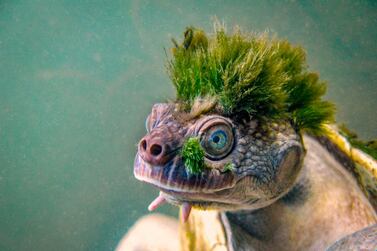Lonely Loris, the abandoned primate who found a home at Dubai's Green Planet, is settling in well and drawing in the crowds to the indoor rainforest bio-dome.
Experts contacted the centre after finding the slow loris abandoned in a box near a veterinary centre in the emirate two months ago.
Staff transferred the primate to the bio-dome’s bat cave, thinking it would be the most appropriate home as it provides the dark environment the nocturnal species is used to.
But Lonely Loris had other plans.
“He kept trying to get through the curtain wall,” said Simon Norris, general manager at the Green Planet.
“We always have someone around, and they noticed that he was always at the door. We said 'OK, we’ll let him out then'.
"He actually likes to be in the company of people. So he sits around with some of our keepers and people.”
This seeming fondness for human company has lead staff to think he was kept as a pet here in Dubai at some point.
Experts say, however, that slow lorises do not make good pets because they like to roam at night and would not able to express their natural rainforest behaviour in a standard house.
And while the Green Planet may not exactly be the wild, it is the next best thing for him as he is able to explore the bio-dome at night and eat a diet consisting of a mix of fruit, insects and seeds that meets his nutritional needs.
During the day, he is stationed up on the second level of the bio-dome, where he sleeps in a wicker basket accompanied by a staff member who explains to visitors who he is and where he comes from.
And after waking in the late afternoon, he has something to eat and then chases around after bugs and worms put out by staff.
“He basically eats and sleeps. That’s his daily routine,” said Mr Norris.
“Slow lorises sleep for up to 16 or 18 hours a day, especially this one, who doesn’t have to forage for food like he would in the wild — he manages to get another couple of hours’ sleep.”
The centre said it is not actively searching for a partner for him, but wants people to know that if another slow loris is abandoned, the Green Planet could provide it with a home.
Lonely Loris may be alone for now, but Mr Norris said he appears to be happy in his new home and is not showing any signs of stress.
“It’s hard to assess whether an animal is actually happy or not but he’s behaving naturally and his weight is increasing. And he likes to be in company — he is interactive with everybody,” said Mr Norris.
But he is not encouraged to sit on the keepers’ laps and the guests are not allowed to touch him, in part because the species can be dangerous.
The slow loris is the only known venomous species of primate. When threatened, they hiss and clasp their paws above their head like a snake before licking a gland on their arm, which releases a substance that mixes with their saliva to create a venomous bite. It can result in anaphylactic shock and even death in humans.







